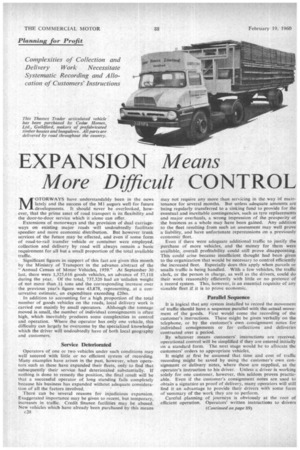EXPANSION Means More Difficult CONTROL M OTORWAYS have understandably been in
Page 64

If you've noticed an error in this article please click here to report it so we can fix it.
the news lately and the success of the Ml augurs well for future developments. It should never be overlooked, however, that the prime asset of road transport is its flexibility and the door-to-door service which it alone can offer.
Extensions of motorways and the provision of dual carriageways on existing. major roads will undoubtedly facilitate speedier and more economic distribution. But however trunk services of the future may be effected, and even if some form of road-to-rail transfer vehicle or container were employed, collection and delivery by road will always remain a basic requirement for all but a small proportion of the total available traffic.
Significant figures in support of this fact are given this month by the Ministry of Transport in the advance abstract of the " Annual Census of Motor Vehicles, 1959." At September 30 last, there were 1,325,616 goods vehicles, an advance of 57,118 during the year. Of the total, 737,320 had an unladen weight of not more than if tons and the corresponding increase over the previous year's figure was 43,878, representing, at a conservative estimate, an expenditure exceeding £20m.
In addition to accounting for a high proportion of the total number of goods vehicles on the roads, local delivery work is carried out mainly by small operators. Although the tonnage moved is small, the number of individual consignments is often high, which inevitably produces some complexities in control and operation. Where the operator has only one vehicle, this difficulty can largely be overcome by the specialized knowledge which the driver will undoubtedly have of both local geography and customers.
Service Deteriorated
Operators of one or two vehicles under such conditions may well succeed with little or no efficient system of recording. Many examples have arisen in the past, however, when operators such as these have expanded their fleets, only to find that subsequently their service had deteriorated substantially. If nothing is done to remedy the position, the final result will be that a successful operator of long standing fails completely because his business has expanded without adequate consideration of all the factors involved.
There can be several reasons for injudicious expansion. Exaggerated importance may be given to recent, but temporary, increases in traffic. Credit finance facilities may be abused. New vehicles which have already been purchased by this means c28 may not require any more than servicing in the way of maintenance for several months. But unless adequate amounts are being regularly transferred to a sinking fund to provide for the eventual and inevitable contingencies, such as tyre replacements and major overhauls, a wrong impression of the prosperity of the business as a whole may have been gained. Any addition to the fleet resulting from such an assessment may well prove a liability, and have unfortunate repercussions on a previously economic fleet.
Even if there were adequate additional traffic to justify th2 purchase of more vehicles, and the money for them were available, overall profitability could still prove disappointing. This could arise because insufficient thought had been given to the organization that would be necessary to control efficiently the increased fleet. Especially does this apply when parcels or smalls traffic is being handled. With a few vehicles; the traffic clerk, or the person in charge, as well as the drivers, could do their work reasonably efficiently with little or no pretence of a record system. This, however, is an essential requisite of any sizeable fleet if it is to prove economic.
Parallel Sequence
It is logical that any system installed to record the movement of traffic should have a sequence parallel with the actual movement of the goods. First would come the recording of the customer's instructions. These might be given verbally on the telephone, or by the customer's own consignment notes for individual consignments or for collections and deliveries contracted over a period.
By whatever means customers' instructions are received, operational control will be simplified if they are entered initially on a standard form. The next stage would be to allocate the customers' orders to appropriate vehicles.
It might at first be assumed that time and cost of traffic recording might be saved by using the customer's own consignment or delivery notes, where these are supplied, as the operator's instruction to his driver. Unless a driver is working solely for one customer, however, this seldom proves practicable. Even if the customer's consignment notes are used to obtain a signature as proof of delivery, many operators will still find it an advantage to provide their drivers with some form of summary of the work they are to perform.
Careful planning of journeys is obviously at the root of efficient operation. Operators' written instructions to drivers (Continued on page 89)








































































































